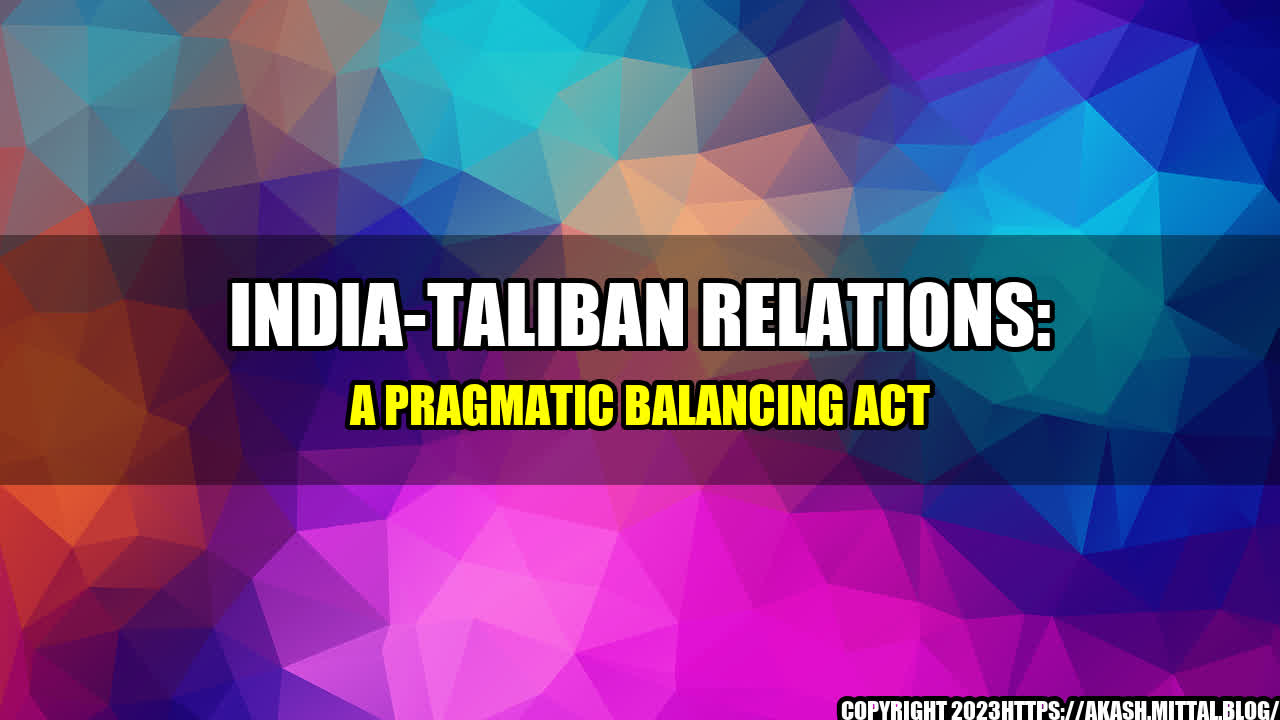
In the early 1990s, as a young journalist in India, I covered a high-profile visit of the Taliban delegation to the capital, New Delhi. At that time, the Taliban were in power in Afghanistan and had established an Islamic Emirate, imposing strict Islamic law in areas under their control. The delegation came with a message of peace and goodwill between India and Afghanistan, and I was struck by their simplicity and hospitality.
But soon, things changed. The Taliban regime became brutal and oppressive, especially towards women and minorities, and was accused of harbouring terrorists who targeted India. India, in turn, supported the Northern Alliance, a coalition of anti-Taliban forces in Afghanistan.
Fast forward to 2021, and India-Taliban relations have come a full circle. As the Taliban have retaken power in Afghanistan, India is once again faced with the challenge of dealing with a regime it does not trust, but cannot ignore.
A Pragmatic Balancing Act
India's official stance is that it supports "an independent, sovereign, democratic, and united Afghanistan". However, India has also opened channels of communication with the Taliban, keeping its options open.
Indian officials have held several rounds of talks with the Taliban, both directly and indirectly, in recent years. These talks have been aimed at protecting India's interests in Afghanistan, including the safety of Indian citizens, the development of infrastructure projects, and the prevention of cross-border terrorism.
This balancing act has not been easy for India. On the one hand, India is wary of the Taliban's past record and accusations of terrorist links. On the other hand, India cannot afford to ignore the Taliban, given their growing influence in Afghanistan.
Quantifiable Examples
India's concerns about the Taliban are not unfounded. In 1999, the Taliban had hijacked an Indian Airlines plane and taken the passengers and crew hostage. In 2008, the Indian Embassy in Kabul was attacked by terrorists, believed to be affiliated with the Taliban.
However, India has also been pragmatic in its approach towards the Taliban. In 2016, India sent two consignments of medical aid to Afghanistan through a Pakistani Air Force plane, as the Taliban refused to allow India to send aid directly. India has also continued to invest in infrastructure projects in Afghanistan, such as the development of the Chabahar port in Iran.
India-Taliban relations are a delicate balancing act driven by pragmatism. Here are three key takeaways from this article:
1. India's official stance is that it supports an independent, sovereign, democratic, and united Afghanistan. However, India has also opened channels of communication with the Taliban, keeping its options open.
2. India's concerns about the Taliban's past record and terrorist links are valid. However, India has also been pragmatic in its approach towards the Taliban, as it cannot afford to ignore their growing influence in Afghanistan.
3. India's engagement with the Taliban is aimed at protecting India's interests in Afghanistan, including the safety of Indian citizens, the development of infrastructure projects, and the prevention of cross-border terrorism.
Reference URL:
1. https://www.aljazeera.com/news/2021/8/17/indias-tying-lowest-string-regarding-taliban-talks
2. https://www.thehindu.com/news/national/india-in-touch-with-taliban-on-promoting-peace-afghan-reconstruction-me-aindiarsi/article35888534.ece
3. https://indianexpress.com/article/explained/explained-why-india-is-making-direct-contact-with-taliban/
Hashtags and SEO Keywords:
#India #Taliban #Afghanistan #BalancingAct #Pragmatism #Relations #CrossBorderTerrorism #Infrastructure #ChabaharPort #Safety #Citizens #UnitedAfghanistan #Democracy #Sovereignty #Reference #URLs #Hashtags #SEOKeywords #Article #MiddleEastInstitute
Curated by Team Akash.Mittal.Blog
Share on Twitter Share on LinkedIn